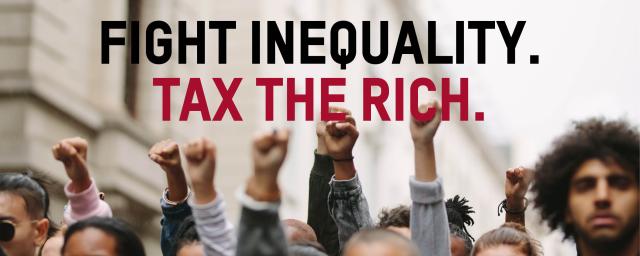
Ten years ago, Oxfam first sounded the alarm at the World Economic Forum, about extreme levels of inequality. Since then, billionaires have almost doubled their wealth and astoundingly since 2020, the richest 1% have snatched-up almost twice as much as the rest of the world combined.
Hundreds of millions are facing impossible rises in the cost of living, and millions are reeling from the pandemic which has already killed over 20 million people. These crises all have winners. The very richest have become dramatically richer and corporate profits have hit record highs, driving an explosion of inequality.
The very existence of billionaires and record profits while poverty and inequality are both on the rise damning proof of a failing economic system. As a starting point toward reducing extreme inequality, the world should aim to dramatically reduce the wealth and number of billionaires between now and 2030, both by increasing taxes on the top 1% and adopting other billionaire-busting policies.
To better understand the rise in energy and food prices, we need to look beyond the logic of supply and demand. Growing evidence points to corporate profits as a significant driver of inflation. Not only are companies passing increased input costs onto consumers, but they are also capitalizing on the crisis, using it as a smokescreen to charge even higher prices.
Oxfam’s analysis of 95 food and energy corporations found that they made $306 billion in windfall profits in 2022; 84% of this being paid to their shareholders, making the already rich, even richer. Governments could raise vital revenue to help fight inequality by implementing one-off taxes on excessive profits and wealth during crises.
The traditional explanation for soaring inflation is that it occurs when demand exceeds supply and pushes up prices, but this logic only partly explains the rising cost of energy and food. The invasion of Ukraine by Russia did lead to reduced gas supply which contributed to an increase in the global price of energy. In the case of food, prices were already rising sharply long before the war, and the interruption of grain supplies from Ukraine made this problem worse.
Food and energy corporations have maintained high prices without the threat of being undercut by competition, and as prices on their end fall, these savings are being passed to their shareholders rather than consumers. This greed-flation led to food and energy companies more than doubling their profits in 2022, paying out $257 billion to wealthy shareholders, while over 800 million people go to bed hungry every night.
There historically have been progressive measures to curb excessive wealth and power of the super-rich during global crisis by increasing taxation of the richest. We can learn from Costa Rica that increased its top rate of income tax by 10 percentage points, from 15% to 25%, and Bolivia and Argentina introduced wealth and solidarity taxes on their richest citizens.
This spirit of solidarity boosts public spending and to fight inequality and limit suffering of ordinary citizens.
When economic crisis hits, ordinary working people are first in line for pay cuts and job losses. In 2020, COVID-19 sparked lockdowns and an unprecedented global economic slowdown. This led to working-hour losses approximately four times greater than during the global financial crisis of 2008, with women and racialized groups being the hardest hit.
Oxfam analysis shows that at least 1.7 billion workers worldwide will have seen a real-terms pay cut in 2022, making it more challenging to feed their families or keep the lights and heating on.We urgently need greater taxation of the ultra-rich and corporations as a measure to fight inflation and inequality.
Oxfam is calling on governments to take immediate measures to increase taxation on the richest, including permanent increases to tax on their incomes and capital, one-off taxes to end crisis profiteering, and taxes on their wealth that are high enough to significantly reduce inequality.
It’s time to fight inequality by taxing the rich.